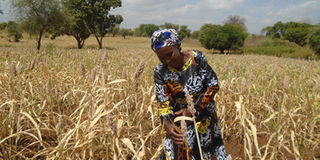Sh26 billion to cushion agriculture

A sorghum farmer attends to her crops in Tharaka Nithi. The World Bank has approved a loan to the country in an effort to cushion smallholder farmers from adverse weather conditions. PHOTO | BRIAN OKINDA | NATION MEDIA GROUP
What you need to know:
- It is a sigh of relief as the weatherman has warned of another year of depressed rainfall.
- The second component, the global lender said, would involve research, production and distribution of weather-resilient seeds to small scale farmers while the third part of the loan will go to marketing and advisory services.
- Official data indicates that 80 per cent of Kenya’s farmers are smallholder.
The World Bank has approved a new loan totalling $250 million (Sh25.8 billion) to finance efforts to cushion Kenya’s agricultural sector from adverse weather.
The loan for the project titled Climate Smart Agriculture will finance research, production and distribution of seeds as the country moves to build resilience to fluctuating weather risks.
“The project will target smallholder farming and pastoral communities in Kenya, and in the event of an eligible crisis or emergency, to provide immediate and effective response,” the World Bank said in its Monday brief.
The loan is a sigh of relief as the weatherman has warned of another year of depressed rainfall. It will, however, push up Kenya’s stock of external debt to new highs. Kenya’s public debt hit Sh3.56 trillion in September
The World Bank said five-part project will start by financing and upscaling “climate-smart” agricultural practices that will cut greenhouse gas emission and boost adaptation to harsh conditions.
The second component, the global lender said, would involve research, production and distribution of weather-resilient seeds to small scale farmers while the third part of the loan will go to marketing and advisory services.
Other components include development of agro-weather forecasting and marketing information system and financing activities.
Official data indicates that 80 per cent of Kenya’s farmers are smallholder. Growers taking part in the project which runs up to 2022 will benefit from improved infrastructure, SME support, water resource management and non-farm income generation.




